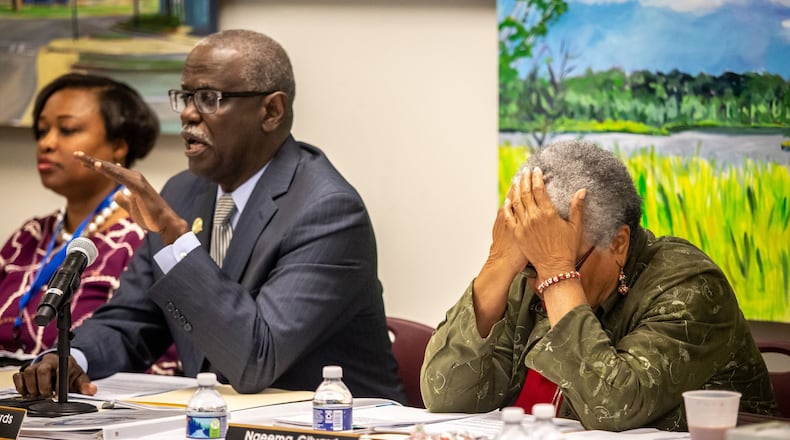South Fulton's mayor and a member of city council will keep their seats after their colleagues adjourned Monday's investigative hearing to remove them from office without taking a vote about their fate.
Since the hearing, the council term of one member who was pushing for the investigations has ended. Another council member, Khalid Kamau, said he didn't think he had the votes to move forward with the removal proceedings and would not push for them to continue.
“I think it’s over,” he said.
Still, Kamau said he believed Mayor Bill Edwards and Councilwoman Helen Zenobia Willis had failed their duties when they didn't tell the Development Authority of Fulton County about a South Fulton measure that requested the development authority defer to the city in making deals.
A $27 million abatement project the county development authority approved for Halperns' Steak and Seafood Company, in the South Fulton city limits, spurred the investigation and removal actions. Monday's hearing featured more than seven hours of testimony.
“If the officials of the city are not responsible for giving notice of the policies of the city, who is responsible?” Kamau asked. “Failing to do so is a lie of omission.”
A report completed before the hearing by investigator Terri Stivarius said that City Attorney Emilia Walker and head of the South Fulton Development Authority, Mayor Pro Tem Mark Baker, were "the two most appropriate persons" to let the county development authority know of city council's wishes.
Willis said she felt vindicated by the lack of action Monday.
"They didn't have any legal standing to remove me," she said. "There was no evidence to prove I did anything wrong."
Willis said the investigation, which started in mid-November and cost more than $50,000, was a waste of taxpayer money.
The hearing ended Monday after an attorney representing the city, John Mrosek, rested his case without calling either Willis or Edwards to testify about their actions or intent. One councilwoman, Naeema Gilyard, had left the city break room where the proceedings were taking place.
At the end of Mrosek’s arguments, with Gilyard absent, Edwards broke a 3-3 tie to adjourn the meeting and the elected officials left without discussing what they heard or voting to take any action.
Edwards said he thought it was time for the city to move forward, now that those council members who thought he and Willis had done wrong had a chance to air their concerns and share the evidence with residents. The hearing was "honest and fair," he said, but didn't convince other council members that he or Willis should be removed from office.
“We can do a lot better,” he said. “Let’s move on for the benefit of the city.”
Gilyard did not respond to phone calls seeking comment, but said in a Facebook post that she had expected to return to the meeting and was concerned that there had been no discussion and no vote. Baker, the mayor pro tem, also did not respond to a phone call seeking comment. But in a Thursday response to an email thread regarding the investigation, he expressed continued concerns about the investigation.
After the hearing, Walker, the city attorney, sent a letter to Stivarius, the investigator, threatening a slander lawsuit in response to the content of Stivarius’ report. Walker would not share a copy of the letter she sent, but said she wanted the report to be corrected regarding her communication with an attorney representing Halperns.
The report doesn’t say anything about Walker’s communication with the attorney, but said she should have known to go to an attorney representing Halperns, and not directly to the company, with concerns about the abatement deal they were making with Fulton County.
Stivarius declined to comment on the report.
Carmalitha Gumbs, a member of city council who voted to adjourn the hearing, said the continued investigations have put council members in a "very uncomfortable place." She said barring criminal activity, it would be up to voters to decide to remove elected officials from office — not their colleagues.
Willis was elected in November to her second term in the city of about 100,000 people.
Gumbs called the process a “debacle.”
“Maybe we need therapy, or to bring someone in to help,” she said. “I’m just praying we’re able to heal this as a community and move forward. We’re really divided. This has caused a lot of heartache.”
About the Author
Keep Reading
The Latest
Featured



